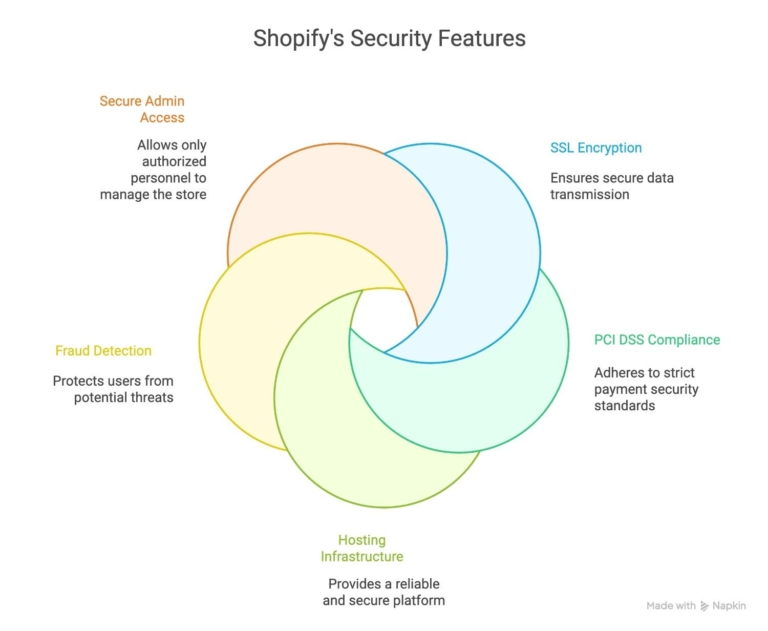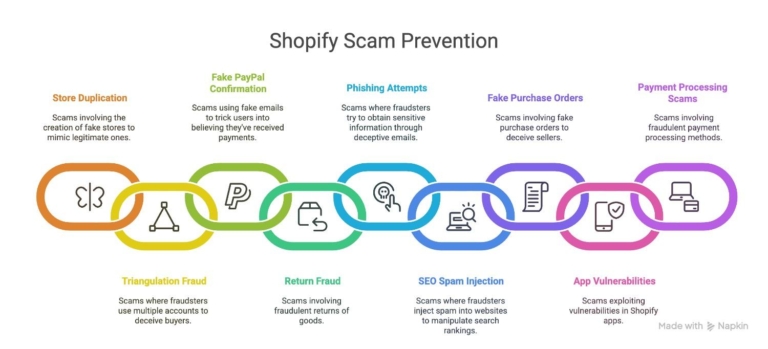Greetings! I'm Aneesh Sreedharan, CEO of 2Hats Logic Solutions. At 2Hats Logic Solutions, we are dedicated to providing technical expertise and resolving your concerns in the world of technology. Our blog page serves as a resource where we share insights and experiences, offering valuable perspectives on your queries.
Quick Summary
Shopify is a legitimate, publicly-traded company powering over 4 million online stores worldwide. With built-in SSL encryption, PCI DSS compliance, and robust security features, Shopify offers excellent protection for both merchants and customers. While no platform is 100% risk-free, Shopify’s security measures greatly outweigh potential concerns, making it one of the safest e-commerce platforms available in 2025.
Ever wondered if you can truly trust Shopify with your business or credit card information?
With so many e-commerce platforms out there, it’s hard to know which ones are legit and which ones might put your data (or your customers’) at risk.
After helping dozens of businesses launch and scale their Shopify stores, we’ve seen firsthand what makes this platform tick from a security standpoint.
Is Shopify safe? The short answer is yes, but there’s more to the story that every merchant and shopper should know.
Let’s dive into what makes Shopify a secure choice for e-commerce in 2025 and what potential risks you should be aware of before committing.
Worried About Shopify Security? Let Our Experts Set Up Your Protected Store
Is Shopify Legit?
Let’s start with the basics, Shopify isn’t some fly-by-night operation or sketchy startup. It’s a legitimate technology giant that powers millions of businesses worldwide.
Shopify is a publicly traded company listed on the New York Stock Exchange (NYSE: SHOP), which means it’s subject to strict financial regulations and transparency requirements. Would major financial institutions invest in a scam? Not likely.
As of 2025, Shopify powers over 4 million active stores globally. These include major brands you know and trust:



Pro tip: Before signing up with any e-commerce platform, check their investor relations page and look for public company information. Legitimate businesses are transparent about their leadership and financial performance.
Ready to Build Your Business on a Trusted Platform? We’ll Help You Launch Safely
Is Shopify Safe to Use?
When it comes to the nitty-gritty of security features, Shopify doesn’t cut corners.

SSL Encryption Everywhere
Every Shopify store automatically gets an SSL certificate, which is the little padlock icon you see in your browser that ensures all data passed between the website and your customers is encrypted.
This isn’t an optional add-on or premium feature like with some platforms. It’s standard for all Shopify stores, even on the basic $29/month plan.
PCI DSS Compliance Built-In
If you’ve ever set up an e-commerce store elsewhere, you know that PCI compliance (the security standard for handling credit card information) can be a nightmare to manage.
Shopify handles this automatically. They maintain Level 1 PCI DSS compliance, the highest level possible, so you don’t have to worry about storing payment information securely.
Rock-Solid Hosting Infrastructure
One major security advantage of Shopify is that it’s fully hosted, with enterprise-grade infrastructure:
- 99.99% uptime guarantee
- Automatic backups of your store data
- DDoS protection against attacks
- Regular security updates are handled automatically
Fraud Detection and Prevention
Shopify actively monitors for suspicious activity across its platform, using AI to detect potential fraud before it happens:
- Bot detection to prevent automated attacks
- Risk analysis on transactions
- Automatic flagging of suspicious orders
- IP address tracking to identify potential threats
Secure Admin Access
Shopify takes admin security seriously with features like:
- Two-factor authentication (2FA)
- Staff account permissions with limited access
- Login notifications for unusual activity
- Session management to automatically log out inactive users
Is Shopify Safe for Buyers?
From a consumer perspective, Shopify offers several layers of protection.
When customers shop on a Shopify-powered store, they’re benefiting from:
- Credit card information that never touches the merchant’s servers directly
- Encrypted checkout process
- Shopify Payments (powered by Stripe) with bank-level security
- Chargeback protection in cases of fraud
One of my clients experienced a situation where a customer claimed they never received their $800 order. Thanks to Shopify’s detailed transaction records and shipping integration, they were able to provide proof of delivery and avoid a costly chargeback.
That said, it’s important to understand that while Shopify provides the infrastructure, individual stores on the platform can vary in reputation. This is similar to how Amazon provides a marketplace, but individual sellers have different reliability.
If you’re shopping on a Shopify store and aren’t sure about its legitimacy:
- Check for contact information and a physical address
- Look for clear return policies and terms of service
- See if they have a social media presence with engagement
- Check reviews from other customers (on-site or through Google)
Is Shopify Safe for Sellers?

For merchants, Shopify offers exceptional protection for your business and customer data.
Data Privacy and Ownership
Unlike some platforms, Shopify is clear that you own your store’s data:
- Customer information belongs to you (with limitations under privacy laws)
- Product data and content remain yours
- You can export your data anytime
App Store Security
The Shopify App Store can extend your store’s functionality, but all apps undergo a review process before being listed:
- Apps are screened for security vulnerabilities
- API access is limited to what each app specifically needs
- You control which apps have access to your store data
Payment Processing Security
When it comes to getting paid, Shopify has built-in protections:
- Shopify Payments provides direct deposit to your bank account
- Clear transaction records for tax purposes
- Dispute resolution tools for chargebacks
- Fraud analysis on incoming orders
| Payment Feature | Shopify’s Approach | Security Benefit |
|---|---|---|
| Card Storage | PCI-compliant vault | Data is protected during transfer |
| Transaction Processing | End-to-end encryption | Data protected during transfer |
| Fraud Analysis | AI risk assessment | Reduces fraudulent orders |
| International Payments | Local payment methods | Secure options worldwide |
Real Risks to Be Aware Of (and How to Avoid Them)
While Shopify itself is safe, there are legitimate risks to be aware of:
Fake Shopify Stores
The biggest security issue isn’t with Shopify itself, but with how some bad actors use the platform. Scammers can create Shopify stores that:
- Advertise products they never intend to ship
- Collect payment information for fraudulent purposes
- Impersonate legitimate brands
How to protect yourself: Verify store legitimacy through reviews, social proof, and checking how long the business has been operating.
Third-Party App Vulnerabilities
While Shopify reviews apps, no process is perfect. Occasionally apps may:
- Request more permissions than necessary
- Contain bugs that create security gaps
- Become abandoned by developers and stop receiving updates
How to protect yourself: Only install apps you truly need, review permissions carefully, and regularly audit installed apps to remove ones you no longer use.
Password and Access Control Issues
Many security breaches happen due to weak passwords or poor access management:
- Staff accounts with unnecessary permissions
- Weak passwords that can be easily guessed
- Shared login credentials between team members
How to protect yourself: Use strong, unique passwords for each staff account, implement 2FA, and regularly review who has access to your store.
Common Shopify Scams to Avoid in 2025
While Shopify itself is a legitimate and secure platform, its popularity has unfortunately attracted scammers who exploit both merchants and customers.
Here are the nine most prevalent scams you need to watch out for in 2025.

1. Store Duplicator Schemes
Scammers create fake copies of legitimate Shopify stores with near-identical URLs and stolen product images to deceive customers.
Always check for URL typos, verify domain age through WHOIS lookup, and cross-reference social media links before making purchases.
2. Triangulation Fraud
This scheme involves criminals using stolen credit cards to buy products from legitimate merchants, then reselling them to unsuspecting customers at discounted prices.
Enable Shopify’s fraud detection tools, implement address verification systems, and flag orders with billing/shipping address mismatches.
3. Fake PayPal Confirmation Scams
Scammers send fraudulent emails mimicking PayPal confirmations to trick merchants into shipping products before payment is actually received.
Always log into your PayPal account directly to verify payments rather than clicking email links, and enable two-factor authentication for added security.
4. Return Fraud Schemes
Fraudsters purchase legitimate products, then return cheaper substitutes or claim items were damaged to receive refunds while keeping the original merchandise.
Photograph all products before shipping, use tamper-evident packaging, and implement strict return verification policies.
5. Phishing Attempts
Cybercriminals send fake emails appearing to be from Shopify, requesting login credentials or personal information to gain unauthorized account access.
Always verify sender email addresses, access your Shopify admin directly through the official website, and never click suspicious links in emails.
6. SEO Spam Injection
Hackers inject malicious code and spammy links into Shopify stores through vulnerabilities in third-party apps or weak passwords.
Regularly monitor your site’s backend for unusual content, keep all apps updated, and use security monitoring tools to detect unauthorized changes.
7. Fake Purchase Order Scams
Scammers pose as legitimate wholesale buyers, sending fake purchase orders for large quantities while requesting payment terms or free samples.
Always verify company credentials through official channels, require deposits for bulk orders, and use contracts for B2B transactions.
8. App-based Vulnerabilities
Malicious developers create fake Shopify apps that request excessive permissions to steal store data or inject harmful code.
Only install apps from trusted developers with good reviews, carefully review permissions before granting access, and regularly audit installed apps to remove unnecessary ones.
9. Payment Processing Scams
Fraudsters create fake payment processing services or impersonate legitimate processors to steal merchant account information and transaction fees.
Always use Shopify Payments or verified third-party processors, research any payment service thoroughly, and be wary of unsolicited offers promising unrealistic benefits.
Shopify vs Other Platforms: Who’s More Secure?
When comparing security across platforms, Shopify consistently ranks among the best options:
Shopify vs WooCommerce
WooCommerce runs on WordPress, which means you’re responsible for:
- Server security
- SSL certificate installation and renewal
- Plugin updates and compatibility
- PCI compliance
- Backup systems
With Shopify, all of the above is handled for you.
Shopify vs Wix
While Wix also offers hosted e-commerce, their payment processing options are more limited, and they lack some of Shopify’s advanced fraud detection tools.
Shopify vs BigCommerce
BigCommerce is Shopify’s closest competitor in terms of security features.
Both offer excellent protection, but Shopify’s larger ecosystem means more security resources and a faster response to potential threats.
| Security Feature | Shopify | WooCommerce | Wix | BigCommerce |
|---|---|---|---|---|
| Hosting Security | Managed by Shopify | Self-managed | Managed by Wix | Managed by BigCommerce |
| SSL Certificate | Included | Self-managed | Included | Included |
| PCI Compliance | Automatic | Self-managed | Automatic | Automatic |
| Fraud Prevention | Advanced | Requires plugins | Basic | Advanced |
| Security Updates | Automatic | Manual | Automatic | Automatic |
Pro tip: When choosing between platforms, consider not just the current security features but how quickly each company responds to new threats. Shopify’s size and resources allow it to adapt rapidly to emerging security challenges.
Conclusion
After working with numerous e-commerce platforms over the years, I can confidently say that Shopify is one of the safest options available for both merchants and customers in 2025.
The bottom line: Shopify’s security features and track record make it a trustworthy choice for e-commerce in 2025. Just remember that even the most secure platform requires users to follow basic security practices.
Need help setting up a secure and optimized Shopify store that converts visitors to customers? At 2HatsLogic, we specialize in building the best e-commerce experiences that combine rock-solid security with lightning-fast performance.
Contact Shopify development services today to discuss how we can help your business grow safely on Shopify.
Need help setting up a secure store? 2Hats Logic can help you launch smartly and safely.
FAQ
Can someone hack my Shopify store?
While no platform is 100% hack-proof, Shopify's security team works around the clock to prevent breaches. The most common "hacks" actually happen through password theft or phishing, not through vulnerabilities in Shopify itself.
Can I lose my customer data?
Shopify maintains backups of all store data. However, it's still good practice to periodically export your customer and order information as an additional backup.
Does Shopify track what I sell?
Shopify does have visibility into transactions on their platform to ensure compliance with their Acceptable Use Policy. However, they don't use your product data for competitive purposes or sell it to third parties.
Will Shopify suspend my account without warning?
Shopify can suspend accounts that violate their terms of service, particularly for prohibited items or fraudulent activity. However, for most policy violations, they typically issue warnings before taking action.

Related Articles








